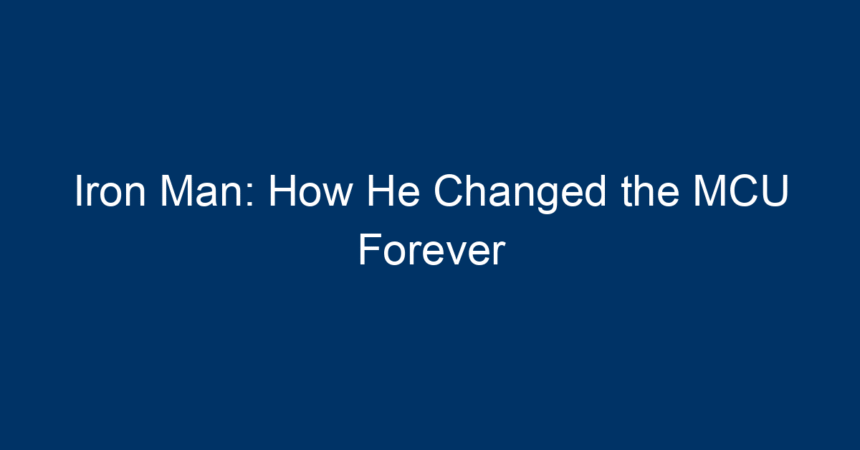Introduction
In the realm of superhero cinema, few characters have left as indelible a mark as Iron Man. When Marvel Studios released "Iron Man" in 2008, it not only introduced audiences to Tony Stark but also laid the groundwork for the Marvel Cinematic Universe (MCU) as we know it today. This groundbreaking film changed the landscape of superhero storytelling and redefined franchise filmmaking. In this article, we will explore how Iron Man transformed the MCU, its lasting impact on cinematic universes, and why it remains a monumental milestone in film history.
The Origins of Iron Man
A Complex Character
Iron Man, a.k.a. Tony Stark, was created by writer Larry Lieber, along with scripter Don Heck and artist Jack Kirby, debuting in "Tales of Suspense" #39 in March 1963. Stark was not just another superhero; he was a flawed genius, a billionaire, and a charismatic playboy. His struggles with personal demons, including alcoholism and ego, made him relatable to audiences far beyond the typical comic book reader.
The Road to the MCU
Before "Iron Man," the superhero genre was primarily dominated by films like the "Batman" franchise and "Spider-Man" films. However, the portrayal of superheroes often leaned toward the exaggerated and fantastical. Iron Man brought, for the first time in comic book cinema, a focus on realism and technology. This concept authors discovered through Tony Stark’s character—the idea that anyone could wear the armor—made Iron Man accessible yet aspirational.
The Impact of Iron Man on the MCU
A New Beginning
"Iron Man" was more than just a film; it was the inception of the MCU. Directed by Jon Favreau and starring Robert Downey Jr. as Tony Stark, the film was a financial and critical success, grossing over $585 million worldwide. This success ushered in a new era of interconnected storytelling. The post-credit scene featuring Nick Fury, played by Samuel L. Jackson, hinted at the formation of the Avengers, establishing a template that Marvel would replicate in future films.
Character Development and Depth
One of the primary reasons Iron Man succeeded was its focus on character development. Unlike traditional heroes whose motivations were often simplistic, Tony Stark was a multi-dimensional character. The film explored his journey from self-absorption to a sense of responsibility—culminating in the transformation of Iron Man into a hero who fights not just for himself but for others. This level of depth has been a cornerstone of the MCU, influencing character arcs in films like "Captain America: The Winter Soldier" and "Black Panther."
The Impact on Visual Effects and Filmmaking
The technology used for Iron Man’s suit was nothing short of revolutionary. The combination of practical effects and CGI brought Tony Stark’s armor to life in a way never before seen in cinema. This innovative approach inspired filmmakers across Hollywood to elevate their own special effects and storytelling techniques. The “Iron Man” suit itself became a symbol of technological advancement and creativity, influencing designs in not just superhero films, but across various genres.
Expanding the Cinematic Universe
The success of Iron Man opened the door for a broader cinematic universe. Marvel Studios took a bold risk with characters that were not widely recognized, such as Thor, Doctor Strange, and Guardians of the Galaxy. Each film was interlaced with references to others, enriching the story and making every release an essential part of a greater narrative.
Iron Man’s Legacy
A Cultural Phenomenon
Iron Man quickly became a cultural icon, personifying the “geek chic” aesthetic. Robert Downey Jr.’s portrayal resonated with audiences worldwide, turning Tony Stark into a household name. The character inspired countless merchandise, comic series, and even video games, proving that Iron Man was not just a film character but a lasting figure in pop culture.
Influence on Future Films
The success of Iron Man set the standard for superhero films, influencing not just Marvel but the entire industry. Others began to emulate its formula, focusing on character development, humor, and interconnected storytelling. Films like "Wonder Woman," "Aquaman," and the "Spider-Man" revivals have been shaped by Iron Man’s groundbreaking approach.
End of an Era
With the conclusion of the Infinity Saga in "Avengers: Endgame," Iron Man met a poignant end. Stark’s sacrifice was an emotional culmination of his character arc—reinforcing the theme of selflessness that had developed since the first film. His legacy continues to influence the MCU, serving as both a benchmark and a guiding light for new heroes emerging in the franchise.
Actionable Insights for Fans and Filmmakers
For Fans
-
Explore the Comics: Dive deeper into the Iron Man comics to understand the rich history and character development that transcends the films.
-
Engage with Online Communities: Join forums and social media groups to discuss theories, share fan art, and explore fan fiction related to Iron Man and the MCU.
- Attend Cons and Events: Participate in comic cons where you can meet fellow fans, engage with creators, and experience Iron Man’s universe through panels and exhibits.
For Filmmakers
-
Prioritize Character Development: Creating a relatable and flawed hero can engage audiences and sustain interest over multiple films.
-
Experiment with Technology: Embrace new technologies and special effects to create unique visual storytelling that captivates audiences.
- Connect Narratives: Build a cohesive universe by subtly interlinking storylines, ensuring that each film contributes to an overarching narrative.
Conclusion
Iron Man is more than just a superhero film; it is a cultural milestone that revolutionized the comic book genre and cinematic storytelling. By introducing a complex character and setting the foundation for interconnected narratives, Iron Man forever changed how audiences experienced superhero stories. Its legacy continues to inspire filmmakers and entertain audiences around the globe, reminding us of the power that lies within each person—just like Tony Stark donning his iconic armor. With every new Marvel entry, Iron Man’s impact resonates, showing that true heroism is about sacrifice, innovation, and the relentless pursuit of betterment.




